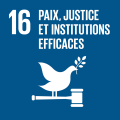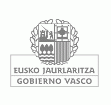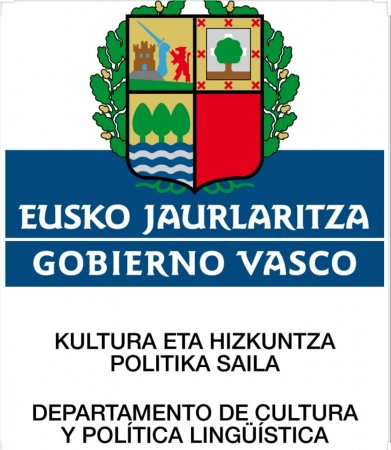Empresas y Derechos Humanos: del Derecho Internacional a los planes nacionales
Description
The approval of the United Nations Guiding Principles has given rise to the development of numerous legislative initiatives, actions and action plans, both at the national and European levels, which have progressively incorporated the concept of due diligence aimed at measuring and preventing impacts. of business activities on Human Rights; with the objective of incorporating respect for Human Rights in business conduct for all companies regardless of where they carry out their activities.
In this direction, the National Plans are aimed at converting the commitment acquired by the States in order to protect Human Rights into real and effective compliance, establishing concrete actions, which should be direct and constructive.
Currently, 13 States of the European Union have National Plans: Spain. Ireland, France, Belgium, Netherlands, Luxembourg, Italy, Slovenia, Germany, Czech Republic, Poland, Lithuania, Sweden and Finland. Portugal has started the process, but has not yet approved it. In addition to the European countries, the United Kingdom, Norway and Switzerland have National Business and Human Rights Plans. Ukraine had a plan before the War.
The Spanish State approved its Plan in 2017, which ended in 2020. and is now awaiting the Draft Due Diligence Directive to begin the Work of its Second Plan.
In addition, it is very important to take into account the legislative and regulatory context made up of the Action Plans and Measures for the protection of Human Rights at the level of the Member States, the role of the EU must be taken into account insofar as the European initiatives in general and the Proposed Directive in particular should serve as a roadmap.
In this context, Globernance has prepared the draft of the Basque Business and Human Rights Plan on behalf of the Department of Peace, Memory and Justice of the Basque Government. The perspective that has marked the development of the work is twofold and is subject to both increasing the role of the company as a social agent, taking into account the impact or potential impact that its activities have on Human Rights in the environment in which it operates. They develop from an ad intra perspective at all levels (social, environmental...), as well as, on the other hand, at an ad extra level taking into account the potential impact that the foreign activity of Basque companies has.
In this way, it is important that the measures that the Plan will adopt are aimed at promoting and encouraging the role of the company both outside and within the Basque Country and, therefore, at promoting behavior that respects Human Rights as a business policy with regardless of where business activities are carried out.
Objectives
Poner en comun con especialistas en materia de Empresa y Derechos Humanos, Instituciones y empresas las nuevas y viejas iniciativas internacionales, europeas y autonómicas, en torno a la diligencia debida y la Empresa y los Derechos Humanos.
Activity directed to
- University student
- Professionals
Program
18-07-2024
Registro / Erregistroa
Presentation by the Director of the activity
- Nerea Magallón Elósegui | UPV/EHU - Investigadora Ramón y Cajal
- Juan José Álvarez Rubio | UPV/EHU - Catedrático de Derecho Internacional Privado
“Conferencia de apertura: El Libro Verde de la RSC de la Comisión Europea y los derechos humanos en la empresa desde una perspectiva de género“
- Maria Elósegui Ichaso | Tribunal de Derechos Humanos - Jueza
Round table: “Panel I: Empresa y Derechos Humanos: contextualización y tendencias normativas“
- Nerea Magallón Elósegui | UPV/EHU - Investigadora Ramón y Cajal (Moderator)
Instrumentos de diligencia debida en materia de Derechos Humanos y medioambiente en el marco del ecosistema regulatorio de la UE sobre sostenibilidad
- Carmen Marquez Carrasco | Universidad de Sevilla - Catedrática de Derecho Internacional Público
La Directiva europea sobre diigencia debida y sostenibilidad
- Juan José Álvarez Rubio | UPV/EHU - Catedrático de Derecho Internacional Privado
Pausa café
Round table: “Panel II: Derechos Humanos y Empresas a nivel autonómico“
- Unai Belintxon Martín | Universidad Pública de Navarra (Moderator)
Los intentos de elaborar una política pública de empresas y derechos Humanos en Catalunya
- Antoni Pigrau Solé | Rovira i Virgil - Catedrático Derecho Internacional Público
Las autoridades estatales/regionales para la supervisión de las prácticas empresariales
- Maria Chiara Marullo | Jaume I, Castellon - Contratada Doctora
La iniciativa vasca
- Nerea Magallón Elósegui | UPV/EHU - Investigadora Ramón y Cajal
Round table: “Panel III: Semejanzas y diferencias de los Planes Nacionales: elementos técnicos de mejora“
- José Luis Iriarte Ángel | Universidad de Navarra - Catedrático de Derecho Internacional Privado (Moderator)
Enpresak eta giza eskubideak atzerriko inbertsioen zuzenbidearen testuinguruan: arau-esparru berrituetara igarotzeko beharra-Empresas y derechos humanos en el contexto del Derecho de las inversiones extranjeras: la necesaria transición hacia marcos normativos renovados
- iñigo Iruretagoiena Agirrezabalaga | UPV/EHU
El Grupo de Trabajo sobre Empresa y Derechos Humanos de las Naciones Unidas como impulsor de los Principios Rectores
- Fernanda Hopenhaym Cabrera | Grupo Trabajo Empresa y Derechos Humanos NU - Representante
Los planes nacionales de empresas y derechos humanos: potencial consuetudinario, desafíos y perspectivas de futuro
- Alberto Jiménez-Piernas García | Asesor Empresa y Derechos Humanos - Doctor en Derecho Europeo Universidad de Bolonia
19-07-2024
Round table: “Panel I: El papel de la empresa como motor de desarrollo social“
- Juan José Álvarez Rubio | UPV/EHU - Catedrático de Derecho Internacional Privado (Moderator)
- Isabel Busto | Adegi - Presidenta
- Carolina Perez Toledo | CEBEK - Confederacion Empresarial de Bizkaia - Presidenta
Pausa café
“Conferencia de Clausura: Derechos Humanos y sector privado: acercamientos y distancias“
- Mariano Aguirre Ernst | Miembro del Consejo Asesor del Instituto de Derechos Humanos, Universidad de Deusto
Closing session
Clausura del curso
- Nerea Magallón Elósegui | UPV/EHU - Investigadora Ramón y Cajal
Directors

Nerea Magallón Elósegui
Universidad del Pais Vasco
Graduated in Law in 1998, I began my university career with a research grant from the Guipuzcoa Provincial research grant from the Diputación de Guipúzcoa. I obtained my DEA with honours at the University of the Basque Country (2000). the University of the Basque Country (2000), I wrote my doctoral thesis for which I was awarded the Extraordinary I was awarded the Extraordinary Doctorate Prize (2006). I finished the thesis during a stay at the Max Planck Institut, Für Ausländisches Und Nternationales in Hamburg. In 2006 I was awarded a two-year Postdoctoral Fellowship (2006-2008) at the Dr. Gioja Institute, Faculty of Law, University of Hamburg, Germany. of the Faculty of Law of the University of Buenos Aires and at L'Ecole doctorale de Droit international, Droit européen, relations internationales et Droit comparé of the University Panthéon Assas, Paris, where I actively participated as a guest lecturer in teaching and research activities. teaching and research activities. In 2009 I joined the University of Santiago de Compostela with a fellowship as a Researcher as a researcher attached to the research grant programme of the Xunta de Galicia, Ángeles Alvariño.

Mikel Mancisidor de la Fuente
Universidad de Deusto
Mikel Mancisidor has a degree in Law and is doctor in International Relations and Diplomacy (DIR GSD) and doctor in History (Universidad de Deusto). He has been Rapporteur of the General Comment on Science and Human Rights of the UN Committee on ESCR (he has been a member of this committee since 2013). He has taught International Law and International Human Rights Law at Deusto, American University and Institute René Cassin. He was awarded the Gold Medal of Rights 2013 and the Eusko Ikaskuntza - Caja Laboral Humanities Award 2020.
Speakers

Mariano Aguirre Ernst
Miembro Asociado de Chatham House (Londres) y Asesor de la Red Latinoamericana de Seguridad de la Fundación Friedrich Ebert (Bogotá). Master en Estudios de Paz y Conflictos, Trinity College, Dublin.Ha sido asesor de la ONU sobre el proceso de paz en Colombia (2017-2019), ex director del Norwegian Centre for Conflict Resolution (NOREF) (Oslo, 2009-2017); co director de FRIDE (Madrid) (2006-2008) y Coordinador de Programas de Paz y Seguridad de la Ford Foundation (New York), (2003-2005). Autor, co-autor y editor de diversos libros sobre relaciones internacionales. Último título: Guerra Fría 2.0. Guía Para Entender la Nueva Política Internacional (Icaria editorial, Barcelona, 2023). Profesor en el Master NOHA del Instituto de Derechos Humanos de la Universidad de Deusto; en el Master de Derechos Humanos de la Fundación de la Universidad Castilla La Mancha; y en la Escuela de Cultura de Paz de la Universidad Autónoma de Barcelona. Escribe en revistas especializadas y medios periodísticos internacionales y españoles como Política Exterior, El País, El Correo, Afkar/Ideas, International Affairs, The World Today, Radio Francia Internacional, y el Anuario Janus (Universidad Autónoma de Lisboa).

Juan José Álvarez Rubio
UPV/EHU, Catedrático Derecho internacional privado
Juan José Álvarez Rubio is Professor of Private International Law at the UPV / EHU and co-founder and Secretary of GLOBERNANCE (Institute for Democratic Governance). He was Secretary General of the Basque Council of the European Movement (EUROBASK / CVME) (May 2003-2012) and currently continues to exercise his function as an expert for the EUROPEAN COMMISSION (General Directorate of Justice, Freedom and Security), on December 17, 2007, for the areas of Civil Justice, borders, protection of personal data and security areas. His lines of research focus on Migration Law and Private International Law, Maritime Law, International Trade Law and Human Rights, European Law and areas related to internal conflicts. He is the author of numerous scientific publications and leads the UPV / EHU's consolidated group of international law as IP. In 2015 he received the Eusko-ikaskuntza-Laboral Kutxa Award for Humanities, Culture, Arts and Social Sciences.
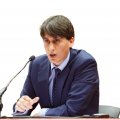
Unai Belintxon Martín
Profesor Contratado Doctor (acr. Profesor Titular) de Derecho internacional privado en la Universidad Pública de Navarra

Isabel Busto

Maria Chiara Marullo

Maria Elósegui Ichaso
Nacida en San Sebastián (Guipúzcoa) en 1957. Es en la actualidad jueza del Tribunal Europeo de Derechos Humanos en Estrasburgo desde 2018, puesto que se convocó por primera vez en una convocatoria abierta a través de concurso público. Catedrática de Filosofía del Derecho en la Facultad de Derecho de la Universidad de Zaragoza donde ha impartido docencia desde hace más de treinta años. Ha dirigido 15 tesis doctorales y ha coordinado durante 15 años el Programa de Derechos Humanos y Libertades Fundamentales. Forma parte en la misma universidad del grupo de investigación de Estudios penales. Licenciada y doctora en Derecho. Así como Licenciada y Doctora en Filosofía. Fellow Research en la Univ. de Glasgow (Escocia) con una beca postdoctoral del Ministerio de Educación (durante dos años). Investigadora de la Universidad de Saint Louis de Bruselas, donde realizó un Máster en Derecho, en el campo de la argumentación jurídica. Investigadora Humboldt (con beca competitiva) para investigadoras otorgada por la Fundación alemana Alexander von Humboldt en la Facultad de Derecho de la Universidad Christian Albrechts de Kiel, Schleswig-Holstein, Alemania, bajo el patrocinio del profesor Robert Alexy. Profesora Visitante del Max Planck I
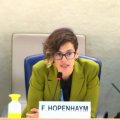
Fernanda Hopenhaym Cabrera
UN Working Group on business and human rights
Fernanda Hopenhaym is the chairof the UN Working Group on Business and Human Rights and co-executive director of the Project on Organizing, Development, Education and Research Project (PODER), a Latin American organisation dedicated to corporate accountability. She has participated in processes related to the implementation of the UN Guiding Principles and other processes related to relevant instruments, such as the Binding Treaty negotiations and due diligence laws. She has conducted research on cases related to the impact of business on human rights and the environment, worked with local communities affected by public/private projects and accompanied them in their quest for justice and remedy. She has conducted global advocacy to advance corporate accountability and human rights, and led training and capacity building on business and human rights issues. She is the former chair of the Board of ESCRNet and is currently a board member of EarthRights International, SOMO and All Out, and an advisor to the Business and Human Rights Award Foundation.

José Luis Iriarte Ángel
Catedrático de Derecho internacional privado de la Universidad Pública de Navarra

iñigo Iruretagoiena Agirrezabalaga
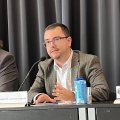
Alberto Jiménez-Piernas García
Alberto Jiménez-Piernas García es doctor en Derecho Europeo por la Universidad de Bolonia (Italia). Como experto en Sostenibilidad corporativa, Derecho Internacional de los Derechos Humanos y RSC, actualmente es Profesor de sostenibilidad, responsable del módulo de empresas y derechos humanos del Máster de Protección Internacional de los Derechos Humanos en la Universidad de Alcalá, además de Investigador del Instituto Universitario de Investigación en Estudios Latinoamericanos. En el ámbito de la consultoría empresarial, es cofundador y CEO de la consultora Segara y fundador de la plataforma de inteligencia empresarial NegocioResponsable.Org, así como editor del Informe Anual Prosostenibles.”

Nerea Magallón Elósegui
Universidad del Pais Vasco
Graduated in Law in 1998, I began my university career with a research grant from the Guipuzcoa Provincial research grant from the Diputación de Guipúzcoa. I obtained my DEA with honours at the University of the Basque Country (2000). the University of the Basque Country (2000), I wrote my doctoral thesis for which I was awarded the Extraordinary I was awarded the Extraordinary Doctorate Prize (2006). I finished the thesis during a stay at the Max Planck Institut, Für Ausländisches Und Nternationales in Hamburg. In 2006 I was awarded a two-year Postdoctoral Fellowship (2006-2008) at the Dr. Gioja Institute, Faculty of Law, University of Hamburg, Germany. of the Faculty of Law of the University of Buenos Aires and at L'Ecole doctorale de Droit international, Droit européen, relations internationales et Droit comparé of the University Panthéon Assas, Paris, where I actively participated as a guest lecturer in teaching and research activities. teaching and research activities. In 2009 I joined the University of Santiago de Compostela with a fellowship as a Researcher as a researcher attached to the research grant programme of the Xunta de Galicia, Ángeles Alvariño.
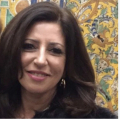
Carmen Marquez Carrasco
Carmen Márquez Carrasco es Catedrática de Derecho Internacional Público y Relaciones Internacionales en la Universidad de Sevilla (US) desde 2014, donde obtuvo el título de doctora en Derecho en 1995 bajo la dirección del Profesor Juan Antonio Carrillo Salcedo, y ejerce desde 2021 el cargo de Directora del Departamento de este área de conocimiento. Desde el año 2010 se ha especializado en materia de empresas y derechos humanos (Business and Human Rights scholar). En este campo, desde 2012, es autora individual de 2 monografías, editora, directora o coordinadora de 5 obras colectivas, autora de 15 capítulos de libros (dos como co-autora), y de 12 artículos de revista. También soy autora o co-autora de 6 informes científicos para el proyecto de investigación colaborativa FRAME (7FP) que incluyen capítulos y recomendaciones a la Comisión Europea sobre esta materia.

Carolina Perez Toledo
Formación • Licenciada en derecho por la UPV/EHU • MBA direccion y gestión de empresas por ESIC • Formación Consejos Administración por ESADE EXPERIENCIA: • Empresaria desde 1988 • Socia y Consejera en LEARNLIGHT • Presidenta de AED desde 2015 • Junta directiva MUTUALIA desde 2019 • Presidenta de CEBEK desde 2021 • Consejera del Puerto de Bilbao desde 2021 • Cónsul Honoraria de Finlandia en el País Vasco desde 2023

Antoni Pigrau Solé
Catedrático de Derecho internacional público de la Universitat Rovira i Virgili desde 1996. Licenciado y Doctor en Derecho por la Universitat de Barcelona. Profesor en la Universidad de Barcelona (1982-1992) y en la Universitat Rovira i Virgili, desde 1992. Director del Centro de Estudios de Derecho Ambiental de Tarragona (CEDAT) (www.cedat.cat). Miembro del Grupo de investigación reconocido por la Generalitat de Catalunya “Territorio, ciudadanía y sostenibilidad” (2021 SGR 00162), del que ha sido coordinador entre 2009 y 2021. Tiene cinco sexenios de investigación y uno de transferencia. Miembro del European Environmental Law Forum Advisory Board. Miembro de la red Empresas y Derechos Humanos, de la Asociación Universitaria Iberoamericana de Postgrado. Ha sido investigador principal en 16 proyectos de investigación y ha participado como investigador en otros 5. Autor de más de 150 publicaciones científicas relativas, entre otros ámbitos, al derecho del medio ambiente, los derechos humanos, el derecho internacional humanitario y el derecho internacional penal. Ha recibido el Reconocimiento Francisco A. Muñoz Muñoz 2021, otorgado por la Asociación Española de Investigación para la Paz (AIPAZ). de 2021.
Registration fees
| Face-to-face | Until 31-05-2024 | Until 18-07-2024 |
|---|---|---|
| 25,00 EUR | 59,00 EUR | |
| - | 84,00 EUR | |
| - | 71,00 EUR | |
| - | 59,00 EUR | |
| - | 25,00 EUR |
Venue
Miramar Palace
Pº de Miraconcha nº 48. Donostia / San Sebastián
Gipuzkoa
Miramar Palace
Pº de Miraconcha nº 48. Donostia / San Sebastián
Gipuzkoa
Sustainable development goals
Agenda 2030 is the new international development agenda approved in September 2015 by the United Nations. This agenda aims to be an instrument to favour sustainable human development all over the planet, and its main pillars are the eradication of poverty, a reduction in equality and vulnerability and fostering sustainability. It is a unique opportunity to transform the world up to 2030 and guarantee human rights for all.

8 - Decent work and economic growth
Foster sustained, inclusive and sustainable economic growth, full and productive employment and decent work for everyone. Key issues: decent work, full and productive employment, entrepreneurship, fostering micro-companies and SMEs, employment rights, safe working environments, youth employment, equal opportunities and pay, strengthening of financial institutions, and breaking the link between economic growth and the degradation of the environment.
More information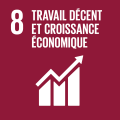
10 - Reduced inequalities
Reduce inequality in countries and between them. Key issues: promotion of the social, economic and political inclusion of all people, equal opportunities, fiscal, wage and social protection policies to favour equality, migration and the policies that affect it, official assistance for the development, regulation and supervision of world institutions and markets.
More information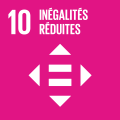
16 - Peace, justice and strong institutions
Foster peaceful and inclusive societies for sustainable development, facilitate access to justice for everyone and construct efficient and inclusive institutions that are accountable at all levels. Key issues: a reduction in violence, mistreatment and exploitation, the rule of law, equal access to justice, a reduction in corruption and bribery, efficient and transparent institutions, participation, access to information, protection of fundamental freedoms.
More information